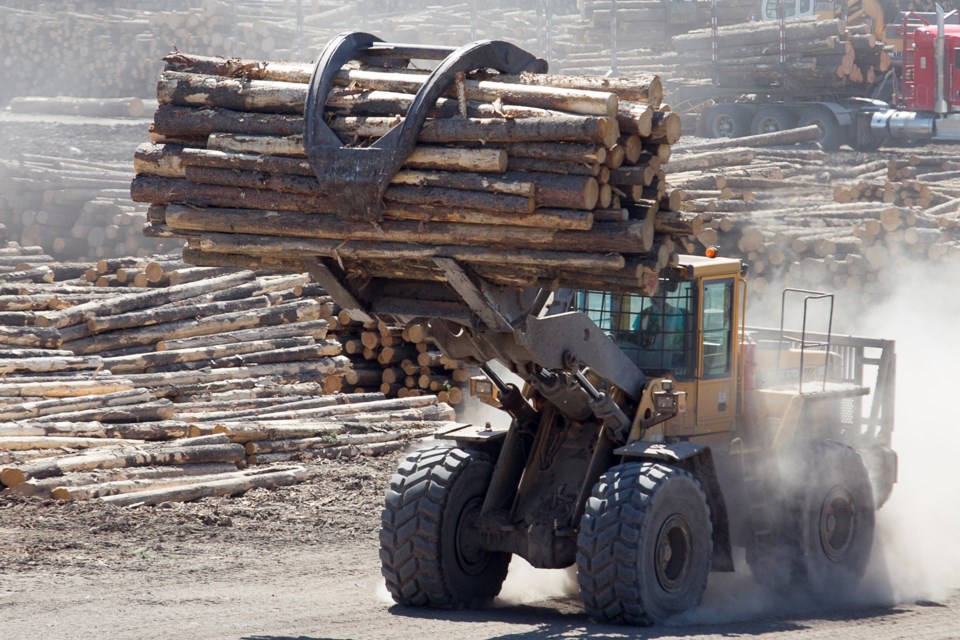MOUNTAIN VIEW COUNTY - Mountain View County's council has been updated on the potential impacts of proposed U.S. tariffs on the Alberta forestry industry.
Brock Mulligan, senior vice-president of the Alberta Forest Products Association (AFPA) appeared as a delegation during a recent Mountain View County council meeting. Jason Foote, general manager of Sundre Forest Products, was also part of the delegation.
“We’ve all seen the news and the moving goal posts, and I want to talk a little bit about how that is going to impact forestry,” said Mulligan. “We know there’s some mitigating measures that can be taken, both by the provincial and federal government.
“We are asking for letters of support from municipalities to push those mitigative measures.”
Sundre Forest Products is part of the Vancouver-based West Fraser integrated wood products company, while the AFPA is an Edmonton-based a non-profit association representing Alberta’s forestry industry.
Roughly 50 per cent of the forest products made in Alberta are currently exported to the U.S. market, Mulligan told council.
“We are very much sensitive to any types of changes in that market,” he said. “The second part is that we are really seeing the potential to have different trade barriers layered on in a way that could be very damaging.
“We’ve got duties on products right now and those are going to go to 30 per cent by late summer or early fall. Then we’ve to the general tariffs that would go on top of those duties.
“And then you layer on that the U.S. is also doing a national security review, which could have another number. So you could be talking about duties and other barriers well in excess of 50 per cent, which could be very damaging.”
The Alberta forestry industry remains very important to the U.S. economy in several ways, he said.
“There is a strong, mutually beneficial relationship between Canada and the U.S. when it comes to the trade of forest products,” he said. “Products from places like Mountain View (County) help Americans construct homes affordably.
“They create jobs in retail, transportation and construction. Pulp from mills throughout Alberta is a feedstock that the U.S. uses support tens of thousands of jobs in their economy.”
Alberta forestry companies purchase lots of U.S. equipment for their mills and harvesting operations, he noted.
There are a number of steps the association believes could be taken to help meet the challenges facing the industry, he said.
Keeping Alberta’s regularly costs low would be helpful, he said.
“We are already a jurisdiction that is very competitive from a Canadian standpoint, but right now with all of these things coming on, we are extremely cost sensitive,” he said.
“It is time to think about things like permitting processes, approvals processes, and all that kind of stuff and focus on keeping those costs low so that we can remain competitive.”
SFP general manager Foote said the company has 234 direct employees in Mountain View County, as well as 330 indirect jobs, $30 million in annual payroll, $15.9 million paid annually to contract services, and $1.6 million paid annually in local and provincial taxes.
“And we invest $40,000 year in our local community for non-profits and things like that,” said Foote.
Regarding the current regulatory environment, he said, “One of the things we are focused on, as Brock (Mulligan) said, is how do we keep the costs low. Things like timely approvals, our ability to plan out ahead efficiently and effectively are big cost drivers in our business.
“We are having quite a bit of trouble in that end of our business, getting timely approvals. Sometimes it’s up to two years to get an approval to do anything and you can imagine what that would be like on our costs.”
Mulligan said using more local wood to build locally would also be helpful.
“There is an opportunity in Alberta to use more of our resource locally, which not only helps to create spaces for folks to live and to do recreational activities and other types of things, but it also protects our products from these kinds of barriers that the U.S. is throwing up,” he said.
“We should be building buildings all across Alberta built with wood that is coming out of Jason’s (SFP) mill and mills throughout Alberta,” he said.
Canada also should be working to develop new markets to reduce reliance on U.S., he said.
“Thinking in the long-term it is definitely something that we are probably going to have to move towards, and it’s something we are going to need infrastructure to make happen,” he said.
Implementing a forestry manufacturing tax credit in Alberta would also be helpful, he said.
Work is ongoing to keep the industry strong in the region, said Foote.
“To speak on Sundre in particular, we are working on things to keep our business strong and a big part of our business is our treated (lumber) business,” Foote said. “A big focus of mine is reducing our exposure to the U.S. market.
“All of that wood that goes through our treated business stays inside Canada. It is a really exciting part of our business and we are lucky in Sundre to have that. We have another mill in Cochrane that has a similar set up.
“We are positioned well in southern Alberta. We are the strongest business unit.”
Council carried a motion accepting the delegation appearance as information.
Council carried a second motion reading: “Council request administration to bring back further information required to consider a letter of support to a future council meeting regarding the Alberta Forest Products Association.”


